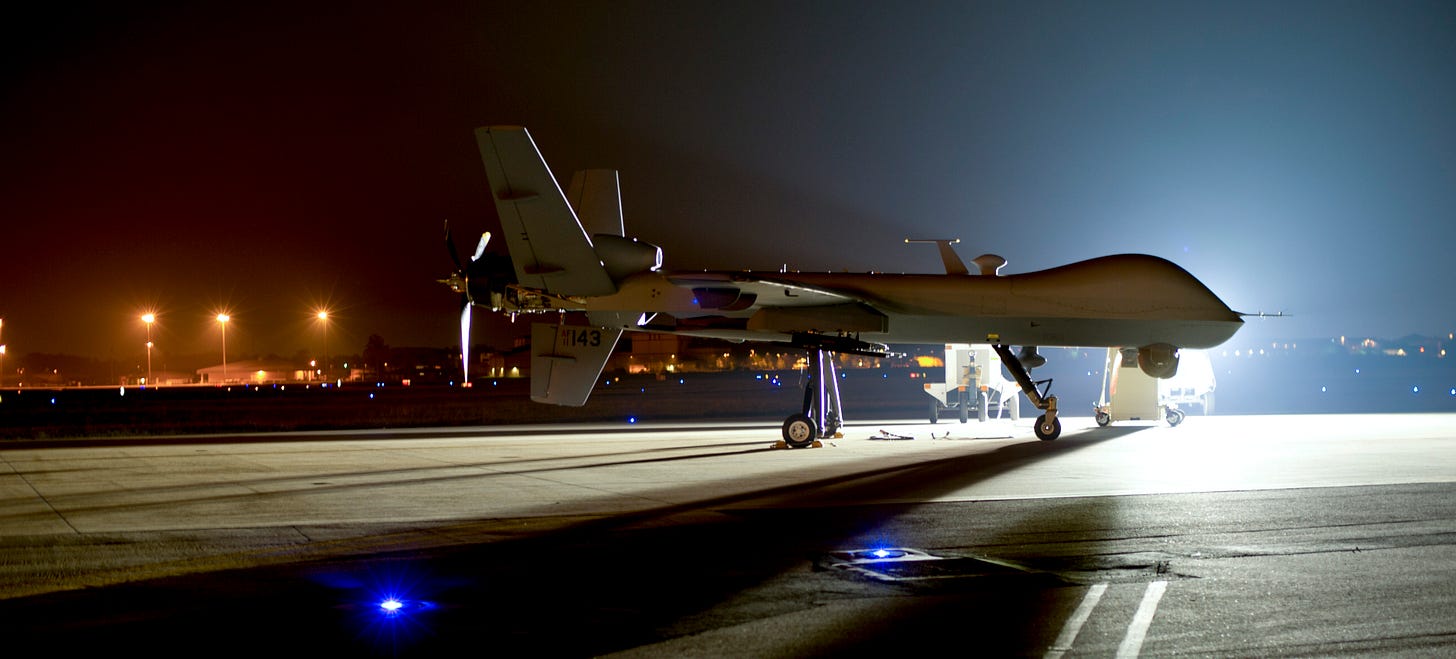When potentially escalatory incidents occur between nuclear armed states who’ve previously taken great pains to put systems in place to avoid escalation, there are a variety of culprits. A genuine accident, subordinates exceeding their orders or authority, or an act of communication are some of the most common. The trick is knowing which one it is. After the events of today, that questions is likely one among many plaguing the Biden administration tonight.
According to US European Command (EUCOM), early today a United States Air Force MQ-9 Reaper drone operating in a intelligence/surveillance/reconnaissance (ISR) capacity was intercepted by two Russian Su-27 aircraft in international airspace over the Black Sea. After the Russian aircraft executed a fuel dump in the flight path of the American drone, one Su-27 deliberately initiated contract with the drone’s prop, resulting in damage significant enough to cause the drone to crash. Both Russian aircraft returned to friendly fields, suspected to be within Crimea. The Russians currently claim no contact was made between the aircraft and the drone lost control and crashed due to “sharp maneuvering”. After being summoned to the US State Department in light of the incident, Russian Ambassador to the US Anatoly Antonov denied Russian culpability, characterized the incident as a “provocation”, and said Russian did not desire a confrontation with the United States.
If we take EUCOM’s account as accurate, it rules out the possibility of a genuine accident. The encounter was deliberate and extended in nature. That leaves the other two possibilities to consider. Were these Russian pilots acting without orders, or exceeding the orders they had? Possible, but it seems unlikely given the nature of the incident. It would have been easier to simply shoot the drone down – something both sides agree did not happen. The drone was unarmed and an easy target for the two Russian jets. Dumping fuel to attempt to cause the drone to crash is a low cost and deniable tactic for both the Russian government and the pilots. Deliberately impacting the prop of the drone, and thus causing the Russian aircraft to sustain visible damage, is not.
Given Russia’s need for aircraft in its current war with Ukraine and its low production capacity for new airframes, damaging an operational aircraft simply to take down an American drone in international airspace, entirely on their own recognizance, would be a terminally stupid action for any Russian pilot to take. Unless of course they had specific orders to do so from higher authority. This leads me to believe they did have such orders and the collision was a message. The content of said message can be easily guessed; US back off.
Russia has been furious for months over US sanctions targeting its economy and US support for Ukraine both monetary and material. While nuclear saber rattling has had some effect in tempering the most hawkish voices in the West, aid continues to flow to Kyiv. NATO ISR flights near Russian borders, specifically around the active combat areas, have also increased dramatically since the beginning of the war. The American government has very foolishly admitted assisting Ukrainian forces with real time intelligence on Russian forces, something ISR drones would be integral in collecting. In my opinion, this helps explain the choice of target through which Moscow has chosen to express its displeasure.
Assuming this was a message, the question for the Americans then becomes “How do we respond?” There was no loss of life, which was certainly a factor considered by the Russians. It occurred in international airspace, though arguably with significant provocation given previous US admissions about our intelligence assistance to Ukraine. If it goes unremarked, it might encourage Russia to take similar steps to bully NATO aircraft in the region operating outside its borders. What then is the appropriate reaction?
While that question is likely being asked all over Washington DC at the moment, one thing is certain. It’s not going to provoke a war. No one wants it, no one would support it. Not over the loss of an unmanned drone.
There are better options. Far more likely is an increased US/NATO fighter presence escorting ISR platforms in the region, both manned and unmanned. Depending on available resources this might cause a shift of additional aircraft into the region from other bases. Announcements, or simply the initiation, of additional aid and/or training being provided to the Ukrainian military in the light of this incident are possible. The levying of additional sanctions is likely also under consideration. The US has a plethora of options, none of which involve direct confrontation.
While this incident is serious, it is not dire. Neither the Russian nor the American governments are desirous of a direct clash, both understand the potential holocaust that could result. This is Russia sending a sternly worded, though superficially deniable, warning to America to back out of its business while it engages in its revanchist war. How the US chooses to respond will indicate how seriously this warning is being taken and just how far President Biden intends to push the issue.


Great analysis, sir, as always.
Green light long range missiles for UKR and let them demolish a couple RU air bases imo